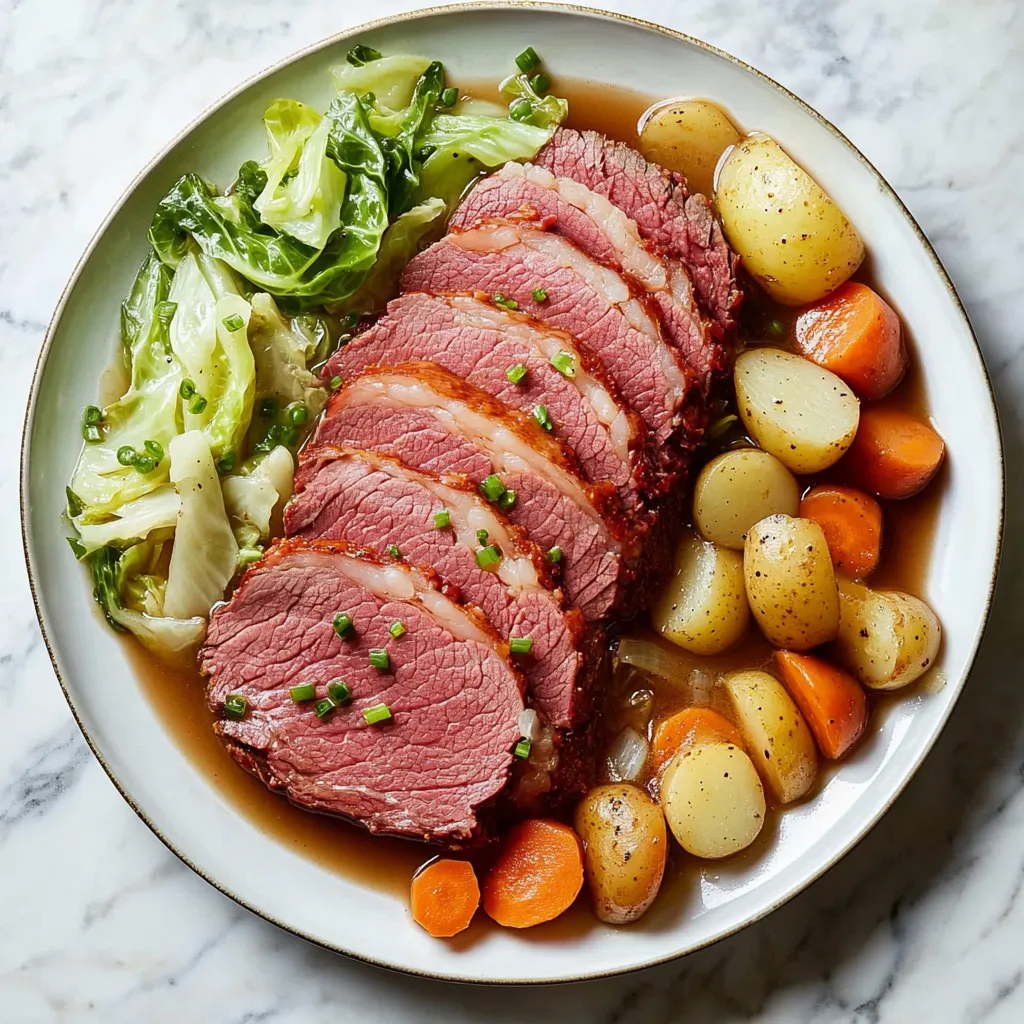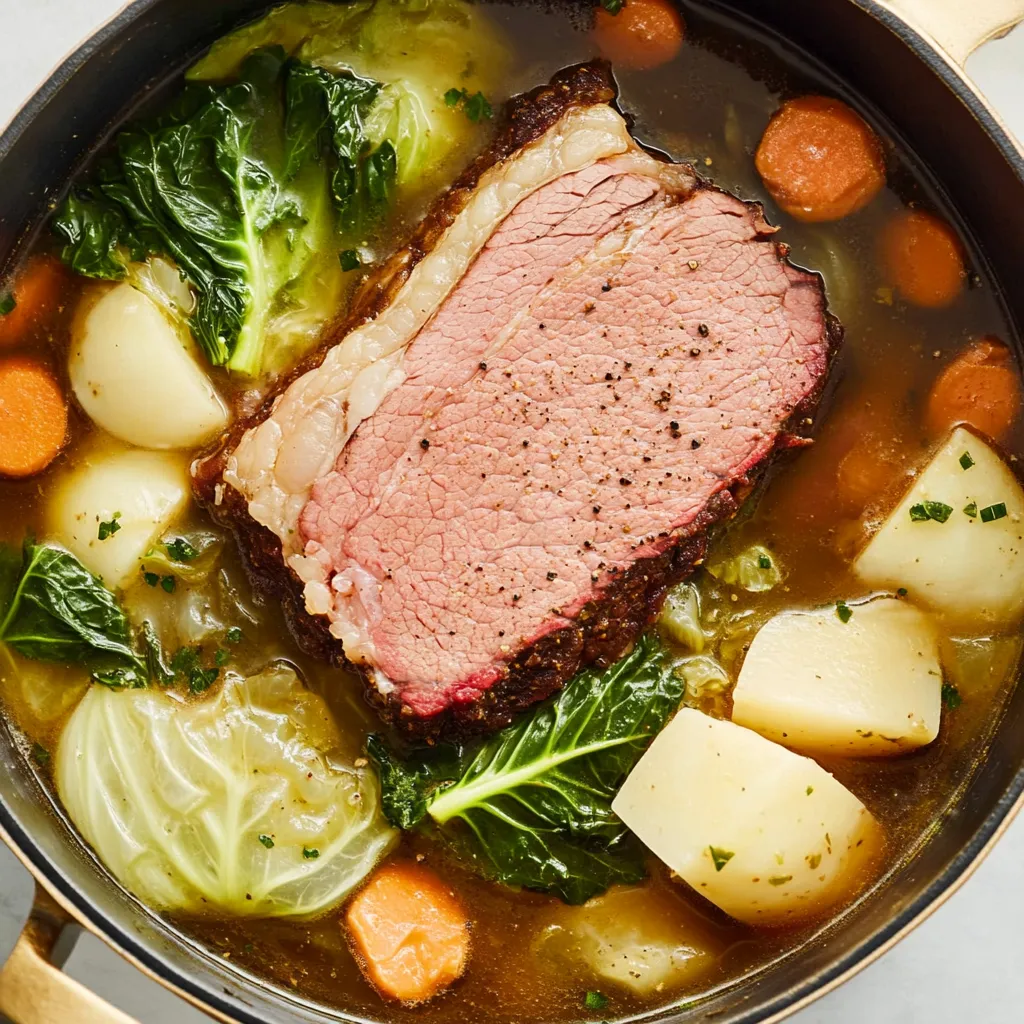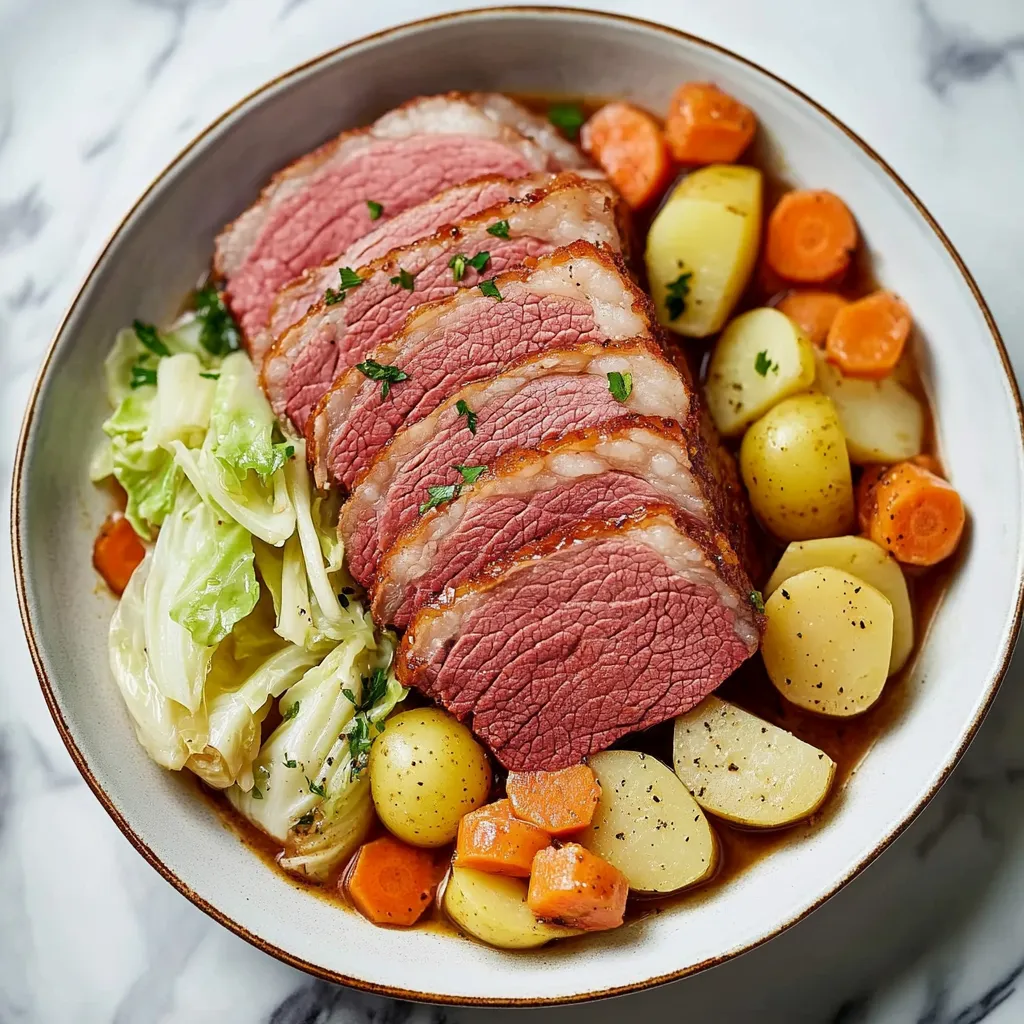 Pin it
Pin it
This stovetop corned beef and cabbage delivers the hearty, comforting flavors that make it a beloved tradition, especially around St. Patrick's Day. The slow-simmered beef becomes incredibly tender while infusing the cooking liquid with rich, savory flavors that then cook the vegetables to perfection. When you slice into that fork-tender corned beef and serve it alongside the sweet carrots, creamy potatoes, and mild cabbage, you get a complete meal that feels both rustic and satisfying.
I've tried every method for cooking corned beef over the years, but I always come back to this stovetop version because it gives me complete control over the process. You can actually see and smell when everything is ready, unlike with a slow cooker where you're just hoping for the best. The first time I made this recipe, I was surprised by how much more flavorful the vegetables were when cooked in the seasoned beef broth rather than just steamed separately.
Essential Ingredients for Authentic Flavor
- Corned beef brisket: Choose flat cut over point cut for more even slicing; comes pre-brined and ready to cook
- Fresh green cabbage: Look for firm, heavy heads with crisp outer leaves; Savoy cabbage works too but has milder flavor
- Small waxy potatoes: Baby Yukon Gold or red potatoes hold their shape better than starchy russets
- Fresh carrots: Choose medium-sized carrots that will cook evenly; avoid baby carrots which can get mushy
- Good beer: Use a lager or brown ale that you'd actually drink; the flavor concentrates as it cooks
- Apple cider vinegar: Adds acidity that helps tenderize the meat and brightens the overall flavor
- Pickling spice packet: Usually comes with the corned beef; adds bay leaves, peppercorns, and aromatic spices
Complete Step-by-Step Cooking Instructions
- Prepare the corned beef properly:
- Remove the corned beef brisket from its packaging and rinse it thoroughly under cold running water to remove excess salt from the curing process. Pat it completely dry with paper towels. This rinsing step is crucial - skip it and your final dish will be overly salty. Place the rinsed beef in a large Dutch oven or heavy pot that can accommodate the meat and vegetables comfortably.
- Build the flavorful cooking liquid:
- Add the pickling spice packet that came with your corned beef to the pot, along with one 12-ounce bottle of lager or brown ale. Add enough cold water to cover the beef by about 2 inches - this usually requires 8-10 cups depending on your pot size. Stir in 2 tablespoons of apple cider vinegar, which helps break down the tough fibers in the brisket and adds a subtle tangy note to the broth.
- Start the long, slow simmer:
- Bring the liquid to a rolling boil over high heat, which usually takes 10-15 minutes. Once boiling, immediately reduce the heat to low and cover the pot partially with the lid. You want to maintain a gentle, steady simmer - you should see occasional bubbles breaking the surface but not a vigorous boil. This low, slow cooking is what transforms tough brisket into tender, sliceable meat.
- Cook the beef to fork-tender perfection:
- Simmer the corned beef for 2.5 to 3 hours, turning it once halfway through cooking. The meat is done when you can easily pierce it with a fork and the fork slides out without resistance. Don't rush this step - undercooked corned beef will be tough and chewy. The exact timing depends on the size and thickness of your brisket, so test for doneness rather than relying solely on time.
- Remove beef and prepare vegetables:
- Carefully lift the cooked corned beef from the pot and place it on a cutting board. Cover loosely with foil to keep warm. Increase the heat under the pot to bring the cooking liquid back to a boil. Add 1.5 pounds of small potatoes and 1 pound of carrots cut into 3-inch pieces. Cook for 10 minutes until the potatoes are almost tender when pierced with a knife.
- Add cabbage and finish cooking:
- Cut one medium head of cabbage into 8 wedges, keeping the core intact so the wedges hold together. Carefully add the cabbage wedges to the pot with the potatoes and carrots. Cook for another 8-10 minutes until the cabbage is tender but still has a slight bite. Don't overcook or the cabbage will become mushy and lose its texture.
 Pin it
Pin it
The transformation that happens during those hours of gentle simmering never fails to amaze me. What starts as a tough, salty piece of beef becomes something so tender you can cut it with a fork. The vegetables pick up all those wonderful flavors from the seasoned broth, creating a meal that's much more than the sum of its parts. My family looks forward to this every March, and the leftovers make incredible hash the next morning.
Understanding Corned Beef Cuts and Selection
When buying corned beef, you'll typically find two cuts: flat cut and point cut. The flat cut is leaner, more uniform in thickness, and slices more neatly, making it ideal for this recipe. The point cut has more marbling and fat, which keeps it moister but makes it harder to slice attractively. Most grocery stores carry the flat cut, which is what I recommend for beginners.
Mastering the Gentle Simmer Technique
The difference between tough and tender corned beef often comes down to temperature control. A gentle simmer means you should see small bubbles occasionally breaking the surface, not a vigorous boil. If your liquid is boiling too aggressively, the muscle fibers will tighten and the meat will become tough. Low and slow is the only way to break down the collagen into gelatin for that melt-in-your-mouth texture.
Timing the Vegetable Additions Perfectly
The key to perfectly cooked vegetables is adding them in the right order based on their cooking times. Potatoes and carrots need longer cooking, so they go in first. Cabbage cooks quickly and can become mushy, so it goes in last. This staged approach ensures everything finishes at the same time with ideal texture.
Slicing and Serving for Best Results
Proper slicing is crucial for tender corned beef. Always slice against the grain - you'll see the direction of the muscle fibers and want to cut perpendicular to them. Slice about 1/4 to 1/2 inch thick for the best texture. If you slice with the grain, even perfectly cooked beef will seem tough and stringy.
Storage and Leftover Ideas
Corned beef keeps well in the refrigerator for up to 5 days and makes excellent leftovers. The classic use is corned beef hash for breakfast, but you can also use it in sandwiches, soups, or even corned beef and cabbage egg rolls. Store the cooking liquid separately - it makes an excellent base for soup or can be used to reheat the vegetables.
 Pin it
Pin it
This recipe represents the kind of traditional comfort food that brings families together around the table. There's something deeply satisfying about the process of slow cooking that transforms simple ingredients into something special. The patience required teaches you to appreciate the alchemy that happens when time, heat, and good ingredients come together in just the right way.
Frequently Asked Questions
- → How long does corned beef take to cook?
- Corned beef needs 2 to 3 hours of gentle simmering until it becomes fork-tender.
- → What cut of corned beef is best?
- Flat cut brisket is preferred because it slices more evenly and has less fat than point cut.
- → Can I use water instead of beer?
- Yes, you can replace the beer with more water or beef broth, though beer adds extra flavor.
- → When do I add the vegetables?
- Add potatoes and carrots 30 minutes before the beef is done, then cabbage in the last 15 minutes.
- → How do I know when corned beef is done?
- The meat is ready when you can easily pierce it with a fork and it shreds apart.
- → Should I rinse the corned beef first?
- Yes, rinse it under cool water for about a minute to remove excess salt and spices.
